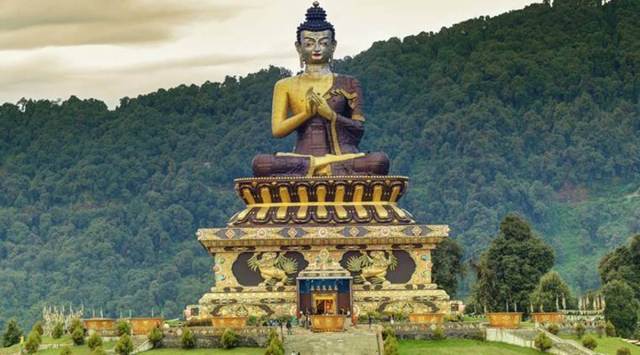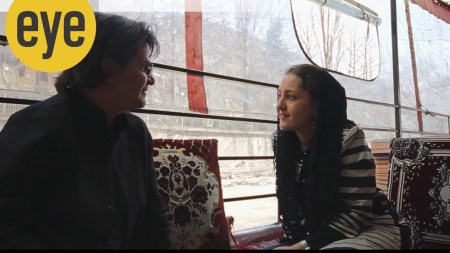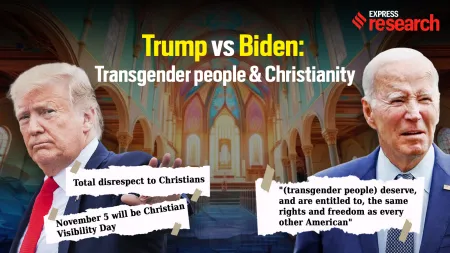- India
- International
India’s Dhamma traditions can show way towards post-pandemic life
Pema Khandu writes: The precept of right livelihood from the Buddha's Eightfold Path shows that true contentment and happiness lie in needs, not wants. By following it, we can create a more sustainable world.
 Lord Buddha talks of an Eightfold Path, which is constituted by the right view, right aspiration, right speech, right conduct, right livelihood, right effort, right mindfulness, and right meditational attainment. (Representational Photo)
Lord Buddha talks of an Eightfold Path, which is constituted by the right view, right aspiration, right speech, right conduct, right livelihood, right effort, right mindfulness, and right meditational attainment. (Representational Photo)For a practising Buddhist like me, “dharma” (dhamma in Pali) would generally mean the teachings of the Buddha — the Four Noble Truths and the Eightfold Path. These teachings have been the guiding light for all Buddhists for over 2,500 years. In some places, Dharma, or Dhamma, is also referred to as the “cosmic law”.
There is a story from the life of Lord Buddha that I would like to share. One day the Buddha asked his monks, “How long is one’s life?” One of them replied, “A few years.” Someone answered, “A few days!” Another responded, “Between meals!” Finally, the Buddha said, “Life lasts for the duration of one breath.” One breath is all that life is. And the Covid-19 pandemic has made us realise the value of our breath. The past two years have seen great misery around the world due to the pandemic. We have lost people close to us. We have also started to look more inwards in these two years. This pandemic has made us realise the value of family and the joys of life that we often ignored.
On the pandemic, His Holiness the 14th Dalai Lama, shared his thoughts: “Ancient Indian tradition describes the creation, abiding and destruction of worlds over time. Among the causes of such destruction are armed conflict and disease, which seems to accord with what we are experiencing today. However, despite the enormous challenges we face, living beings, including humans, have shown a remarkable ability to survive”. Indeed, humans have this remarkable ability to survive — our ancient wisdom of Dharma or Dhamma teaches us to come together in times of adversity. The entire scientific fraternity came together and got us the vaccine in record time. Such is the power of humanity.
The Dharma Dhamma traditions of our country provide such paths that can help build a post-Covid world order. Lord Buddha talks of an Eightfold Path, which is constituted by the right view, right aspiration, right speech, right conduct, right livelihood, right effort, right mindfulness, and right meditational attainment.
Nagarjuna, one of the greatest philosophers of India, showed the “Middle Way” to the world and, taking inspiration from his teachings, I would like to discuss the “right livelihood” for a post-Covid world. There is a conference going on in Glasgow on climate change called COP26. Global leaders have made commitments to make Mother Earth a sustainable planet, to mitigate global warming, protect vulnerable communities and natural habitats, mobilise finance and work together to deliver on these promises.

Prime Minister Narendra Modi delivered a historic speech at COP26 where he talked of “LIFE — L, I, F, E, which means ‘Lifestyle For Environment’”. He added: “This can become a mass movement of an environmentally-conscious lifestyle. What is needed today is mindful and deliberate utilisation, instead of mindless and destructive consumption.” The Prime Minister made unprecedented commitments on behalf of India at this global conference and presented the concept of “Panchamrit”, to deal with this challenge, which included becoming carbon-neutral country 2070.
 These commitments are huge and would require the “right livelihood” to achieve them. I come from the land of Arunachal Pradesh. There are 26 major tribes in my state and over 100 sub-tribes. We have a forest cover of around 80 per cent, which is among the highest in the country. Our tribes value jal, jungle and zameen, and have evolved to live in harmony with them. In current times there is a need to find the right balance to fulfil the development aspirations of society and conserve natural resources. Development in the 21st century will have to find a way to incentivise states like Arunachal Pradesh, which are natural carbon sinks, to preserve our rivers and forests.
These commitments are huge and would require the “right livelihood” to achieve them. I come from the land of Arunachal Pradesh. There are 26 major tribes in my state and over 100 sub-tribes. We have a forest cover of around 80 per cent, which is among the highest in the country. Our tribes value jal, jungle and zameen, and have evolved to live in harmony with them. In current times there is a need to find the right balance to fulfil the development aspirations of society and conserve natural resources. Development in the 21st century will have to find a way to incentivise states like Arunachal Pradesh, which are natural carbon sinks, to preserve our rivers and forests.
The right livelihood that I am talking of requires true contentment and happiness which lies in needs, not wants. Success will not be found through the gratification of desire but at the end of desire — which is contentment. Wealthy will be the person who enjoys what they have. The philosophy and practices of right livelihood involve doing what needs to be done for the wellbeing of the self, others and our planet.
It is time now to advocate and work towards reviving the Nalanda tradition of Buddhism in India. This treasure of knowledge and traditions, preserved over centuries by our Tibetan sisters and brothers under the aegis of His Holiness the Dalai Lama, must be translated into all the major Indian languages. I hope learned scholars will build upon these thoughts comprehensively for a harmonious world order.
This column first appeared in the print edition on November 12, 2021 under the title ‘Dhamma and the pandemic’. The writer is the chief minister of Arunachal Pradesh. Edited excerpts from a speech delivered at the 6th Dharma Dhamma Conference in Nalanda University, Bihar, on November 9, 2021.
EXPRESS OPINION
More Explained
May 04: Latest News
- 01
- 02
- 03
- 04
- 05








































